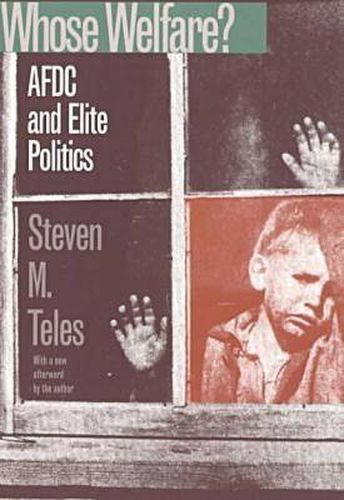Readings Newsletter
Become a Readings Member to make your shopping experience even easier.
Sign in or sign up for free!
You’re not far away from qualifying for FREE standard shipping within Australia
You’ve qualified for FREE standard shipping within Australia
The cart is loading…






Few American social programs have been more unpopular, controversial, or costly than Aid to Families with Dependent Children (AFDC). Its budget, now in the tens of billions of dollars, has become a prominent target for welfare reformers and outraged citizens. Indeed, if public opinion ruled, AFDC would be discarded entirely and replaced with employment. Yet it persists. Steven Teles’s provocative study reveals why and tells us what we should do about it. Teles argues that, over the last thirty years, political debate on AFDC has been dominated by an impasse created by what he calls ideological dissensus–an enduring conflict between opposing cultural elites that have largely disregarded public opinion. Thus, he contends, one must examine the origins and persistence of elite conflict in order to fully comprehend AFDC’s immunity to the reform it truly needs-the kind that unites the elements of order, equality, and individualism central to the American creed.
One of the first studies to analyze AFDC from a New Democrat position, Whose Welfare? sheds new light on the controversial role of the courts in AFDC, the rise of welfare waivers in the mid 1980s, the failure of the Clinton welfare plan, and the victory of block-granting over policy-oriented welfare reform.
Teles, however, goes beyond mere critical analysis to advocate specific approaches to reform. His thoughtful call for compromise built around the centrality of work, individual responsibility, and opportunity offers a means for dissolving dissensus and genuine hope for changing an outdated and ineffectual welfare system.
Based on interviews with participants in the AFDC policymaking process as well as an unparalleled synthesis of the voluminous AFDC literature, Whose Welfare? will appeal to a wide array of welfare scholars, policymakers, and citizens eager to better understand the tumultuous history of this problematic program and how it might fare in the wake of the fall elections.
$9.00 standard shipping within Australia
FREE standard shipping within Australia for orders over $100.00
Express & International shipping calculated at checkout
Few American social programs have been more unpopular, controversial, or costly than Aid to Families with Dependent Children (AFDC). Its budget, now in the tens of billions of dollars, has become a prominent target for welfare reformers and outraged citizens. Indeed, if public opinion ruled, AFDC would be discarded entirely and replaced with employment. Yet it persists. Steven Teles’s provocative study reveals why and tells us what we should do about it. Teles argues that, over the last thirty years, political debate on AFDC has been dominated by an impasse created by what he calls ideological dissensus–an enduring conflict between opposing cultural elites that have largely disregarded public opinion. Thus, he contends, one must examine the origins and persistence of elite conflict in order to fully comprehend AFDC’s immunity to the reform it truly needs-the kind that unites the elements of order, equality, and individualism central to the American creed.
One of the first studies to analyze AFDC from a New Democrat position, Whose Welfare? sheds new light on the controversial role of the courts in AFDC, the rise of welfare waivers in the mid 1980s, the failure of the Clinton welfare plan, and the victory of block-granting over policy-oriented welfare reform.
Teles, however, goes beyond mere critical analysis to advocate specific approaches to reform. His thoughtful call for compromise built around the centrality of work, individual responsibility, and opportunity offers a means for dissolving dissensus and genuine hope for changing an outdated and ineffectual welfare system.
Based on interviews with participants in the AFDC policymaking process as well as an unparalleled synthesis of the voluminous AFDC literature, Whose Welfare? will appeal to a wide array of welfare scholars, policymakers, and citizens eager to better understand the tumultuous history of this problematic program and how it might fare in the wake of the fall elections.